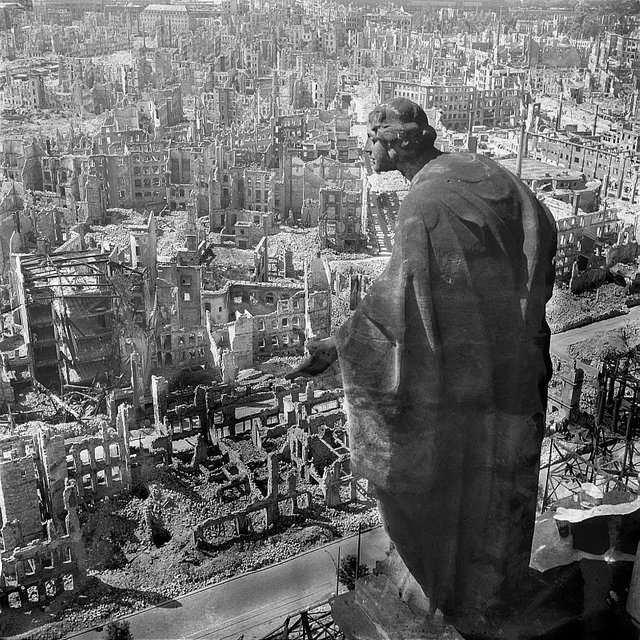Banish the phrase from yoga classes, wellness retreats, and the potions aisle in Whole Foods.

German city of Dresden in 1945 — Deutsche Fotothek Blick vom Rathausturm
Millennials love the idea of reliving the last half of the 20th century, the one we all grew up watching on the Wonder Years. We were led to believe it was a time that defined everything we love about America. Giant leaps in civil rights, a martyred saint president, a nationwide ethical rejection of war in favor of peace, free love, the Greatest Generation defeating evil, and the twilight of communism. The unfortunate truth is that the last half of the 20th century should be recognized for the attempted murder of the future.
The idea of “live for today” in America arose in the 1960's.
When I think of all the worries
People seem to find
And how they’re in a hurry
To complicate their minds,
By chasing after money
And dreams that can’t come true
I’m glad that we are different
We’ve better things to do
May others plan their future
I’m busy loving you
- “Live for Today,” The Grass Roots
Catchy and highly effective. In the face of imminent threats, Americans have decided to stop worrying about the future, and focus on right now. We don’t save for the future, instead electing to take on massive amounts of debt. America saves just 18% of it’s GDP, China saves 46%. The federal budget deficit is $174 billion for the first four months of fiscal year 2018, $16 billion more than the shortfall recorded during the same period last year. There is no balanced budget in sight, nor calls for it within congress.
“Live for now” has diminished our position in the global economy, as well as the strength of our currency. Long term thinking is what built this country. Didn’t we used to be a goal-oriented society focused on beating the soviets and landing on the moon?
In 1919, a 28-year-old army officer named Dwight Eisenhower took a trip across the country before there were any highways. He had such a miserable experience that, as president in 1956, he decided to spend $25 billion to build 41,000 miles of interstate highways. He reasoned it was for the defense of the nation so he was able to take the money from the military. Taking money from the military for any reason these days is tantamount to treason.
There hasn’t been a significant national investment in infrastructure since. Trains have had the ability to travel over 150 mph since the mid-1950s, but we have few in this country, all still under construction. Since 1964, over 10 billion people have ridden the Shinkansen bullet trains of Japan, the equivalent of approximately 140% of the world’s population, without a single train passenger fatality.
Just what brought “live for today” about? Was there some change that shifted the preference to short term thinking from long? It seems self evident that living for today has consequences (such as floating islands of plastic in the Pacific ocean, currently the size of Texas), many of which aren’t realized by the current generation, which is why it’s so convenient.

The wheel moves forward.
Spiritual folks are going to respond with references to Buddha and Mindfulness with a capital M. Let us reference the definition of Mindfulness, the quality or state of being conscious. Science agrees with Buddhism that the mind is a structure, and consciousness is a process within it. Mindfulness comes from the Sanskrit term Sati, which is part of the Eight Fold Path, a series of steps in which one cultivates self discipline by putting aside worldly desires. Buddhism teaches to delay gratification so that our future becomes a path to enlightenment. The practice of living for today is the opposite and opposing force to the right action of traveling the path.
We are fascinated by the present and the recent past to the detriment of deeper historical understanding. Period pieces are extremely popular, ask yourself how many you’ve watched on Netflix just this year, despite how formulaic or contrived. It appears the only fascinations we have with the future are centered around how technology will make it easier or protect us, rather than what greater goals we can achieve.
As the new millennium dawned, the consequences of living for today have begun to weigh upon the backs of the largest generation of Americans. Previous generations were given piggy banks; they could finish high school and buy a house. Millennial's go to college, saddled with debt, move to a city to own nothing but an unhealthy desire for a safe space, an iPhone, and IKEA furniture. We are fragile because we are afraid of the future, so we ignore it. We don’t know what it holds because we aren’t building it. So instead, in our apathy, we have become weapons of mass destruction, drones, and vehicles of war.

The F-35. Do we need to spend 1.5 Trillion dollars on this over the course of our lifetimes?
In 2015, 54% of discretionary tax dollars went to the military because America is a war machine (6% to education, 3% to housing and urban development). For the period 2010–14, SIPRI found that the United States was the world’s biggest exporter of major arms. The Department of Defense asked for almost $688 Billion for 2016, up $100 billion from 2015. For 2019 we gave them $716 Billion and approval for 25,900 more soldiers. We aren’t planning on building the future of this country, just its future military capability.
Misspending our tax dollars is living in the present. Seeking a global hegemony will not maintain our place in the world, nor will it make us happy. We’ve all but abandoned the idea of a balanced budget, and most of us seek to escape to find balance rather than build it within our own lives. To live in the present moment requires one to ignore the signs up ahead.
What else are we doing to destroy the future? Take your pick. For one, we are polluting the lungs of the planet. Deforestation has trended upwards since 2012, with a sharp 29% increase in the rate of clearing in 2016. Until governments declare initiatives to save the environment at all costs, we will continue to lose it.
Only by thinking about the long term can we survive this inter-glacial period of the Holocene epoch. Currently, it’s not looking good. The global average sea level has risen by about 7–8 inches since 1900, with almost half (about 3 inches) of that rise occurring since 1993. In 2030, just 12 years from now, the sea will rise over half of a foot. The last three years have been the warmest years in 11 millennia.
“We are all astronauts,” said the futurist polymath Buckminster Fuller. His idea of the Great Pirate illustrates that all resources are not equally distributed on this planet. The time has come to stop pretending the invisible hand of the market evenly distributes them. Only if mankind returns to building the future can we escape the endless cycle of boom and bust. Stop saying live for today, stop thinking solely about today or focusing on the now, because if we don’t, we won’t have a tomorrow. We have to care more about the future than the present.
“The point of the Clock is to revive and restore the whole idea of the Future, to get us thinking about the Future again, to the degree if not in quite the way same way that we used to do, and to reintroduce the notion that we don’t just bequeath the future — though we do, whether we think about it or not. We also, in the very broadest sense of the first person plural pronoun, inherit it.” — Michael Chabon “The Omega Glory”, January 2006